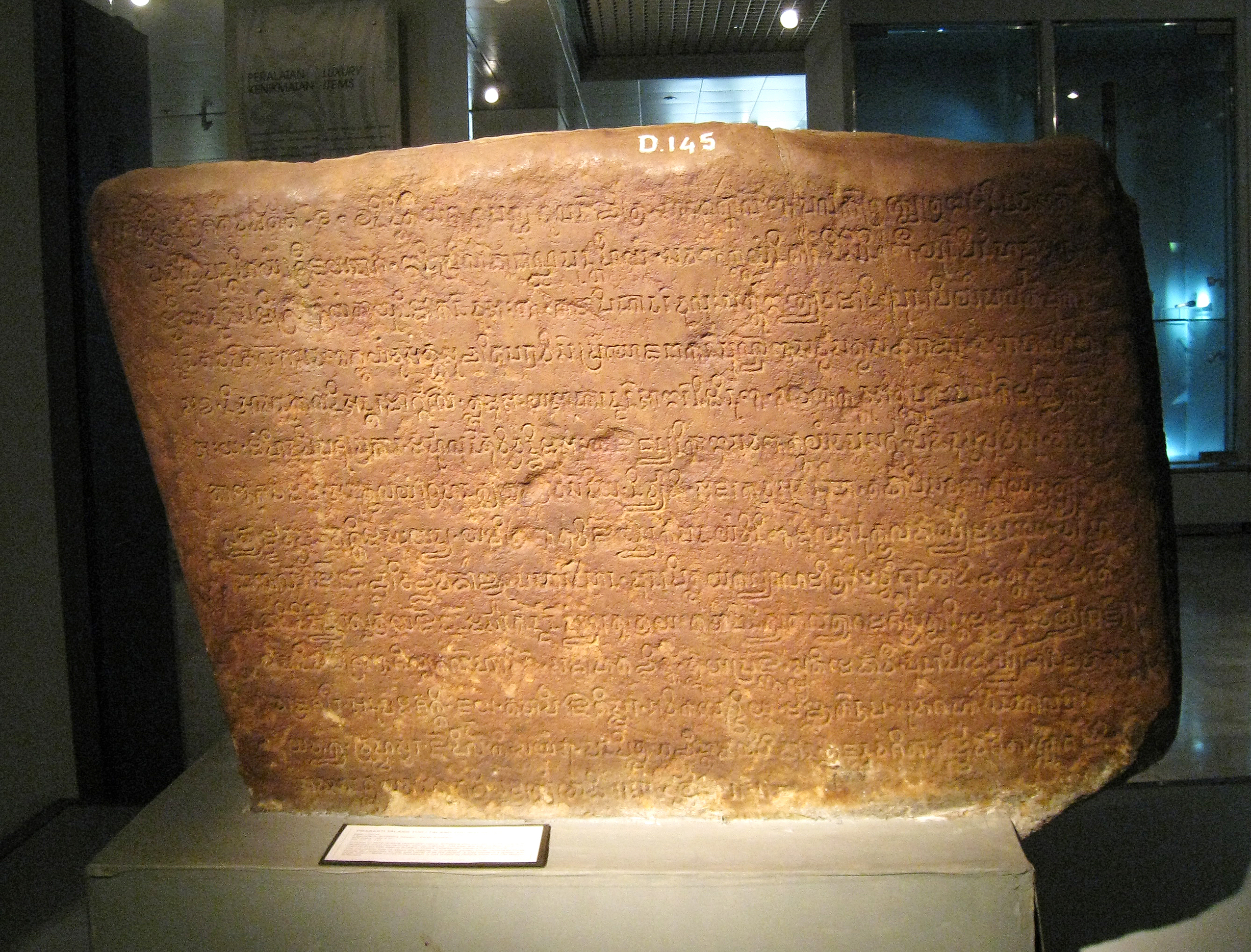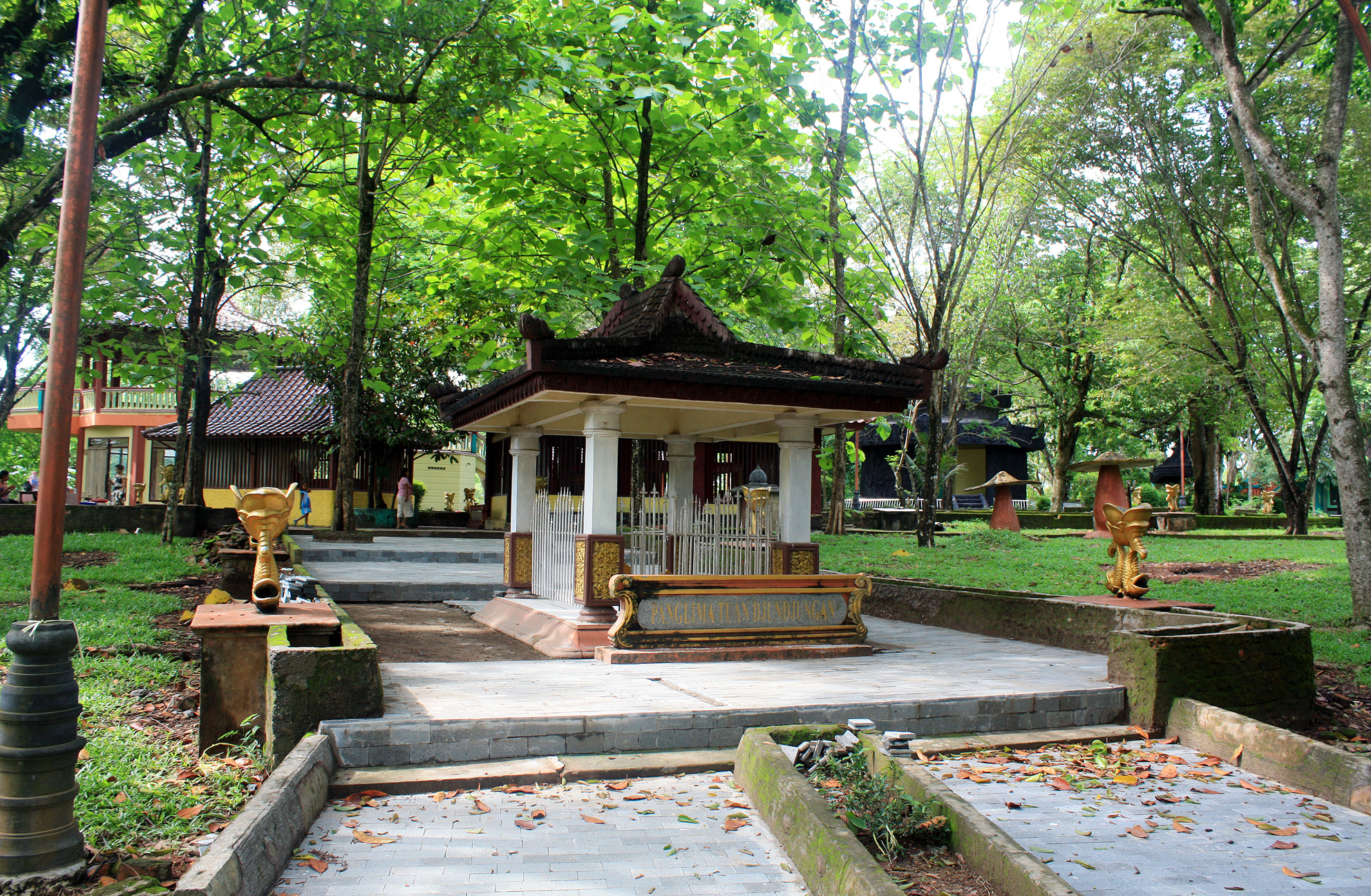Bukit Seguntang on:
[Wikipedia]
[Google]
[Amazon]

 ''Bukit Seguntang'' or ''Bukit Siguntang'' (
''Bukit Seguntang'' or ''Bukit Siguntang'' (
 Bukit Seguntang is the highest point in Palembang city. The complex is a hill with garden and large trees. On higher grounds within the complex there are some tombs linked by locals to the figures of Malay-Srivijayan royalties and heroes. There are seven Srivijayan figures entombed here:
* Raja Sigentar Alam
* Pangeran Raja Batu Api
* Putri Kembang Dadar
* Putri Rambut Selako
* Panglima Tuan Junjungan
* Panglima Bagus Kuning
* Panglima Bagus Karang
According to
Bukit Seguntang is the highest point in Palembang city. The complex is a hill with garden and large trees. On higher grounds within the complex there are some tombs linked by locals to the figures of Malay-Srivijayan royalties and heroes. There are seven Srivijayan figures entombed here:
* Raja Sigentar Alam
* Pangeran Raja Batu Api
* Putri Kembang Dadar
* Putri Rambut Selako
* Panglima Tuan Junjungan
* Panglima Bagus Kuning
* Panglima Bagus Karang
According to

 ''Bukit Seguntang'' or ''Bukit Siguntang'' (
''Bukit Seguntang'' or ''Bukit Siguntang'' (English
English usually refers to:
* English language
* English people
English may also refer to:
Peoples, culture, and language
* ''English'', an adjective for something of, from, or related to England
** English national ...
: Seguntang Hill or Siguntang Hill) is a 29–30 metres high small hill
A hill is a landform that extends above the surrounding terrain. It often has a distinct summit.
Terminology
The distinction between a hill and a mountain is unclear and largely subjective, but a hill is universally considered to be not as ...
located at the northern bank of Musi River Musi may refer to:
* Musi River (Indonesia)
* Musi River (India), Telangana
* Moosy River, Andhra Pradesh, India
* Musi language, a Malay language spoken in Indonesia
* Angelo Musi (1918–2009), American basketball player
* Agostino de' Musi, rea ...
and within the vicinity of Palembang, capital city of South Sumatra
South Sumatra ( id, Sumatra Selatan) is a province of Indonesia. It is located on the southeast of the island of Sumatra, The province spans and had a population of 8,467,432 at the 2020 Census. The capital of the province is Palembang. The prov ...
, Indonesia. It is located around 3 kilometres north from Musi River Musi may refer to:
* Musi River (Indonesia)
* Musi River (India), Telangana
* Moosy River, Andhra Pradesh, India
* Musi language, a Malay language spoken in Indonesia
* Angelo Musi (1918–2009), American basketball player
* Agostino de' Musi, rea ...
northern bank and around four kilometres southwest from Palembang city center. The place is considered sacred by the locals and home of many archeological relics believed to be related to Srivijaya
Srivijaya ( id, Sriwijaya) was a Buddhist thalassocratic empire based on the island of Sumatra (in modern-day Indonesia), which influenced much of Southeast Asia. Srivijaya was an important centre for the expansion of Buddhism from the 7th t ...
Empire, once a dominating political power around Malacca Strait (6th to 13th century AD). Today the hill gain status as an archaeological park.
In 1920s, a Buddha
Siddhartha Gautama, most commonly referred to as the Buddha, was a wandering ascetic and religious teacher who lived in South Asia during the 6th or 5th century BCE and founded Buddhism.
According to Buddhist tradition, he was born in Lu ...
statue was discovered in this hill. It was discovered in pieces, the head part was discovered first, several months later the body parts were discovered, however the leg part is still missing.
The 277 cm tall statue was made from granite stone commonly found in neighboring Bangka Island
Bangka is an island lying east of Sumatra, Indonesia. It is administered under the province of the Bangka Belitung Islands, being one of its namesakes alongside the smaller island of Belitung across the Gaspar Strait. The 9th largest island in ...
. The statue followed the Amaravati style that flourished in Southern India around 2nd to 5th century CE. The style was adopted during Srivijaya
Srivijaya ( id, Sriwijaya) was a Buddhist thalassocratic empire based on the island of Sumatra (in modern-day Indonesia), which influenced much of Southeast Asia. Srivijaya was an important centre for the expansion of Buddhism from the 7th t ...
era, and its origin was estimated circa 7th—8th century CE. Today it is displayed in Sultan Mahmud Badaruddin II Museum, near Kuto Besak fort.
In Seguntang Hill area also found fragments of Boddhisattva
In Buddhism, a bodhisattva ( ; sa, 𑀩𑁄𑀥𑀺𑀲𑀢𑁆𑀢𑁆𑀯 (Brahmī), translit=bodhisattva, label=Sanskrit) or bodhisatva is a person who is on the path towards bodhi ('awakening') or Buddhahood.
In the Early Buddhist schools ...
statue, a ruin of stupa made of sandstone and brick, fragment of inscription, stone statue of Boddhisattva
In Buddhism, a bodhisattva ( ; sa, 𑀩𑁄𑀥𑀺𑀲𑀢𑁆𑀢𑁆𑀯 (Brahmī), translit=bodhisattva, label=Sanskrit) or bodhisatva is a person who is on the path towards bodhi ('awakening') or Buddhahood.
In the Early Buddhist schools ...
, statue of Kuwera, and a statue of Buddha Vairocana in seated position complete with ''prabha'' (halo aura) and ''chattra'' (umbrella). The fragment of inscription is called Bukit Siguntang Inscription, mentioned about a great battle that shed a lot of blood upon ''Bhumi Srivijaya
Srivijaya ( id, Sriwijaya) was a Buddhist thalassocratic empire based on the island of Sumatra (in modern-day Indonesia), which influenced much of Southeast Asia. Srivijaya was an important centre for the expansion of Buddhism from the 7th t ...
'' which means the Srivijaya
Srivijaya ( id, Sriwijaya) was a Buddhist thalassocratic empire based on the island of Sumatra (in modern-day Indonesia), which influenced much of Southeast Asia. Srivijaya was an important centre for the expansion of Buddhism from the 7th t ...
n Land. The inscription also mentioned about a curse for those who had done evil deed.
In the southern side of the hill lays Karanganyar site, where sherds from Tang
Tang or TANG most often refers to:
* Tang dynasty
* Tang (drink mix)
Tang or TANG may also refer to:
Chinese states and dynasties
* Jin (Chinese state) (11th century – 376 BC), a state during the Spring and Autumn period, called Tang (唐) ...
and early Sung dynasties were found. Two stone inscriptions dated back to seventh century AD were found in its vicinity in 1920s.Wolters, O.W. 1986. Restudying Some Chinese Writings on Sriwijaya. ''Indonesia'' 42:1-41.
Tomb complex
 Bukit Seguntang is the highest point in Palembang city. The complex is a hill with garden and large trees. On higher grounds within the complex there are some tombs linked by locals to the figures of Malay-Srivijayan royalties and heroes. There are seven Srivijayan figures entombed here:
* Raja Sigentar Alam
* Pangeran Raja Batu Api
* Putri Kembang Dadar
* Putri Rambut Selako
* Panglima Tuan Junjungan
* Panglima Bagus Kuning
* Panglima Bagus Karang
According to
Bukit Seguntang is the highest point in Palembang city. The complex is a hill with garden and large trees. On higher grounds within the complex there are some tombs linked by locals to the figures of Malay-Srivijayan royalties and heroes. There are seven Srivijayan figures entombed here:
* Raja Sigentar Alam
* Pangeran Raja Batu Api
* Putri Kembang Dadar
* Putri Rambut Selako
* Panglima Tuan Junjungan
* Panglima Bagus Kuning
* Panglima Bagus Karang
According to Malay Annals
The ''Malay Annals'' ( Malay: ''Sejarah Melayu'', Jawi: سجاره ملايو), originally titled ''Sulalatus Salatin'' (''Genealogy of Kings''), is a literary work that gives a romanticised history of the origin, evolution and demise of the g ...
manuscript, Bukit Seguntang is believed to be the place where a demi-god hero being named Sang Sapurba Sri Maharaja Sang Sapurba Paduka Sri Trimurti Tri Buana, (1245–1316) also known as Sri Nila Pahlawan, is a figure in the Malay Annals, highly revered as the legendary great ancestor of some of the major dynasties of the Malay world: Singapura, Ma ...
descended to earth. He later become the ancestor of Malay kings that ruled kingdoms in Sumatra, Western Borneo, and Malay Peninsula. Bukit Seguntang was revered as the part of Mahameru sacred mountain in Hindu-Buddhist mythology. It is considered sacred because it was believed as the homeland of Malay people
Malays ( ms, Orang Melayu, Jawi: أورڠ ملايو) are an Austronesian ethnic group native to eastern Sumatra, the Malay Peninsula and coastal Borneo, as well as the smaller islands that lie between these locations — areas that are col ...
. The kings that ruled Malacca Sultanate
The Malacca Sultanate ( ms, Kesultanan Melaka; Jawi script: ) was a Malay sultanate based in the modern-day state of Malacca, Malaysia. Conventional historical thesis marks as the founding year of the sultanate by King of Singapura, Paramesw ...
was said to be the descendants of Sang Sapurba.
Notes
References
* Ahmad Rapanie, Cahyo Sulistianingsih, Ribuan Nata, "Kerajaan Sriwijaya, Beberapa Situs dan Temuannya", Museum Negeri Sumatera Selatan, Dinas Pendidikan Provinsi Sumatera Selatan. {{coord, 2, 59, 50, S, 104, 43, 32, E, display=title Palembang Srivijaya Buddhism in Indonesia Geography of South Sumatra Archaeological parks Buildings and structures in South Sumatra Tourist attractions in South Sumatra